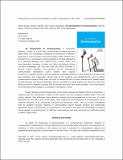| dc.description.abstract | because it comes at a time when communication scholars from the
global South are increasingly challenging the dominance of Western
modernity in communication and media studies. Many scholars have
decried the U.S.–UK duopoly of communication and media scholarship
as a colonizing ideology (e.g., Asante, 2011; Thussu, 2009); and
some journalism programs in Kenya and other sub-Saharan African
countries undoubtedly still use texts that are wholly American in
content, theory, methods, and examples. At the International
Communication Association’s (ICA’s) October 2016 regional
conference in Nairobi, Kenya, numerous speakers encouraged Africans on the continent to produce their
own textbooks, with contextually relevant and current examples and highlighting the work of African
communication scholars. While many are quick to lament the lack of locally relevant texts, Rahab Nyaga,
Dorothy Njoroge, and Charles Nyambuga deserve accolades for taking matters into their own hands and
doing the work to produce a Kenyan text for Kenyan and other East African students. The three authors
are all Kenyan scholars based at universities in the Nairobi vicinity.
Nyaga, Njoroge, and Nyambuga’s text is also timely because sub-Saharan Africa, as elsewhere, is
grappling with the revolutionary impact of the Internet and the consequent digital divide, which the
authors address. They effectively merge Western concepts and local perspectives in their text. In a brief
statement (on the back cover of the book), they underscore the importance of communication as an
academic discipline “in an increasingly connected and democratic world.” This is “a timely foundational
book for students” because “students of communication require focused, practical and contextually
appropriate books to ground them in the discipline.” The authors also stress the advantages of studying
communication by asserting that it is “effective communication that puts individuals and institutions ahead
of others” (back cover) | en_US |

